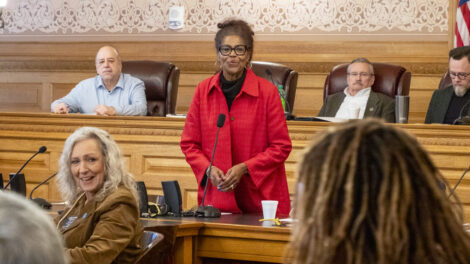As Trump’s second term nears, new KU center set to study ‘democratic backsliding’ and whether it will happen here
Some polls show openness to abandoning elections

photo by: AP Photo/Yuki Iwamura, Pool)
Former President Donald Trump waits for the start of proceedings in Manhattan criminal court, Tuesday, April 23, 2024, in New York.
You thought there would be a break from the big questions.
After all, for more than a year, every news program on television, every other email in your inbox and seemingly every robocaller in the universe told you we were engaged in answering the question of our lifetime.
Biden or Trump?
Come to find out, it was a two-for-one special because we actually meant: Harris or Trump?
OK, we checked that box, or more literally, filled in the oval circle. We’re done, right?
A new center at the University of Kansas is betting that we’re not. The Center for Democratic Governance is up and running within the university’s Institute for Policy & Social Research. As its name implies, the center believes the new question isn’t about a person, but rather is about democracy itself.
If you are looking for the CliffsNotes version of the question, it basically is whether America is about to embark on a path of “democratic backsliding.” That’s the phrase political scientists use to describe countries that have taken steps — oftentimes willingly — to back away from long-held norms of democracy.

photo by: University of Kansas
Chris Koliba
Chris Koliba, founder and director of the new center, doesn’t know where that path will lead in America, but he’s sure it has become an urgent question to answer.
“There is a key concern of where we will head as a country, and what the status of democracy will be when all is said and done,” Koliba, a distinguished professor in KU’s School of Public Affairs & Administration, said in a recent interview with the Journal-World.
So, if it makes you feel any better, you are not being asked to answer the question of your lifetime, again.
Rather, it may be the question of the country’s lifetime.
Democracy doubts
While politicians are fond of saying that the only poll that matters is the one on Election Day, there have been some recent polls that are nonetheless eye-catching when it comes to the future of democracy. A June survey by the polling firm Ipsos asked 1,000 voting-age Americans to weigh in on different types of governments and whether they would be a good or fairly good way of governing America.
A “democratic political system” did garner the most positive response — 80% — which should hearten those who are fans of elections and other democratic norms. But the poll, which allowed people to choose more than one response, also showed a striking openness to a system that would be the opposite of democracy. The poll found 41% of Americans surveyed thought a system with a “strong leader who does not have to bother with parliament or elections” would be a very good or fairly good system for Americans.
An October 2023 poll by the Center for Politics at the University of Virginia asked more than 2,000 registered voters whether they agreed with the statement that “Democracy is no longer a viable system, and America should explore alternative forms of government to ensure stability and progress.” The survey found that 31% of likely Trump voters, at the time, agreed with the statement, as did 24% of likely Biden voters.
Figuring out why is a key question for KU’s new center, Koliba said. Much work remains to be done on that issue, and some of it will focus on Trump and how his role as a “rule breaker” has changed not only American politics, but perhaps views on democracy itself. Koliba stressed that the center is nonpartisan, but he said it won’t shy away from critically examining evidence that points to Trump as a weakening force in democracy.
But the center also will look at what else may be turning Americans away from democracy. That includes examining some of the “culture war” issues and how those are dividing Americans. Are Americans willing to turn away from democracy if they feel it doesn’t protect traditional American values? The answer is not yet clear, but the question is worth examining, Koliba said.
“I think the left, the progressives, the more left-leaning liberals of the population have distanced themselves from traditional American values a bit,” Koliba said. “They have ceded that narrative to the ultra right and are allowing them to define what that means.”
Koliba also said he’ll be closely watching whether Americans are in any mood to approach Trump’s “grand experiment” with an open mind.
“There may be some things that are enacted that are disruptive enough that they will make some substantive changes in people’s lives,” Koliba said. “The question will be, can we acknowledge where it does work? That will be hard for some in the opposition to think that way.”
Trump’s proposals also may require Americans to do some important balancing acts, as some of Trump’s proposals likely will produce a mix of losses and gains for people.
“Are you willing to lose some of your freedoms to be secure?” Koliba asked. “Are you willing to give up fairness to be more efficient? These are grand tradeoffs that we need to be able to better understand and appreciate.”
The Center for Democratic Governance is expected to have upward of 20 members of KU’s faculty serving as collaborators. Koliba, who is still gathering partners, said the center is expected to have experts in law, philosophy, international relations, psychology, sociology and other fields, in addition to KU faculty in public administration, which is one of the most highly ranked programs of its kind in the nation.
“I think there is an appetite at KU to establish a space like this,” said Koliba, who came to KU last year from the University of Vermont. Koliba said he wanted to get out of the “northeast bubble” to establish such a center. He said locating the center in the center of the country has good symbolism, but also is practical. Much of Trump’s political base has been in rural states, like Kansas. Being physically close to those voters may be helpful in understanding their motivations.
Such understanding is a key goal of the center. Koliba said it is clear there is a segment of voters who supported Trump, even though they know that the 2020 election was not stolen from him. They know he wanted to stay in power despite there being no evidence that he was entitled to remain in office. For Koliba and many other researchers of democracy, the fact such a politician was able to win election again has been confounding.
“That they would vote for someone who basically undermines the peaceful transfer of power strikes many of us as that ‘I never thought I would experience this in my lifetime’ moment,” he said.

photo by: AP Photo/Jose Luis Magana
Rioters loyal to President Donald Trump rally at the U.S. Capitol in Washington, Jan. 6, 2021.
‘It is going to be messy’
Koliba said there is a sort of “shock” and “numbness” that has afflicted some segments of the American political public since the election. Perhaps one of the most interesting questions of the next few weeks and months is whether that numbness wears off. The answer, Koliba believes, will impact an entire generation, not just the next four years.
“I do think the left, the activist side of the left, will have to get mobilized,” Koliba said of possible protests and movements against Trump’s policies.
If such mobilization doesn’t occur, what then?
“We become apathetic and we let authoritarianism take root and last for a generation,” Koliba said.
The actual answer, in fairness, probably depends on what actually happens. What policies are enacted? How are voters’ wallets impacted? Does democracy actually decline?
Only time will answer those questions, but Koliba shared a few things he will be watching for as the next four years unfold. They include:
• The military. Koliba said the worst-case scenario for democracy is the military begins to lose its strong sense of professionalism. There are laws, for instance, that prevent the military from being used on domestic matters, unless it is invited to do so by a governor. While those laws are important, Koliba said the professionalism of U.S. military service has long been the country’s “saving grace.” Any signs of the Trump administration truly reshaping the military could be a big red flag, he said.
• The federal bureaucracy. The federal government employs more than 2 million civil servants, and most hold nonpartisan positions. But that hasn’t always been the case. In the late 1800s and into the early 1900s, there were still many ordinary government jobs that took into account your political affiliation in hiring. The results were predictable: People who had the same political affiliation as the party in power were much more likely to get a federal job. Koliba said a return, even on a more limited scale, to that patronage-type of system will be one of the first red flags he’ll be watching for.
• Laws versus norms. In countries where “democratic backsliding” has occurred, it often has come through violating democratic norms rather than actual laws, Koliba said. For example, the idea of recess appointments — the process of a presidential appointment being filled while the U.S. Senate is out of session, and thus avoiding the Senate confirmation process — is not illegal. However, the idea of using such a process for Cabinet-level appointments certainly isn’t the norm. That idea, which has been floated by President-elect Trump, is just one example of many norms that could be tested during the next four years, Koliba said.
“Because they are not codified into law, they are not legally enforceable,” Koliba said of many of the norms. “When you have a political party that is willing to transgress such norms, it can create chaos.”
Of course, it also can create protests. Such protests have been less frequent recently than in the days and weeks following Trump’s 2016 election. But Koliba thinks that will change as Trump’s term begins.
“I’m sure there is going to be agitation and movements,” Koliba said. “The question becomes how does that get framed? Does (Trump) mobilize the military to crack down on protests? There is a lot of gaslighting. Does he talk about false flags?”
What shape the response — both from the administration and the opposition — takes will be critical.
“I don’t think it will be a quiet rollover,” Koliba said. “It is going to be messy, I believe.”
The end result, though, doesn’t have to be a mess, a democracy diminished. Sometimes change — or opposition to change — can bring people together in unexpected ways.
There’s also another event — usually less dramatic — that has been known to bring people together: A birthday party. America will have a big one during the Trump administration. America’s 250th birthday will be in 2026. Koliba hopes that celebration will help the country have “deeper conversation of what our values are.”
“We have to do our best as citizens to provide avenues for hope, and rekindle our appreciation for what binds us together as a country,” he said.
Perhaps remembering July 4, 1776 — the day the Declaration of Independence was adopted, amid literal gunshots of war with Great Britain — will provide some needed perspective.
“We need to appeal to each other’s common humanity,” Koliba said. “I think when we do that and turn down the heat, we can realize we are not domestic enemies of each other. We may have policy differences, but we are not enemies.”






